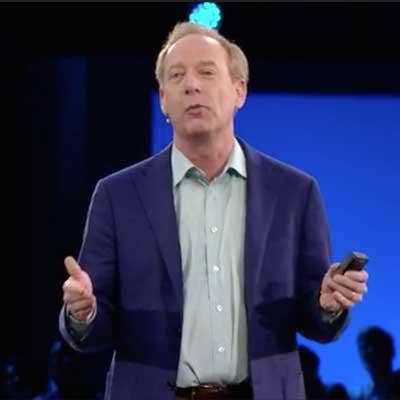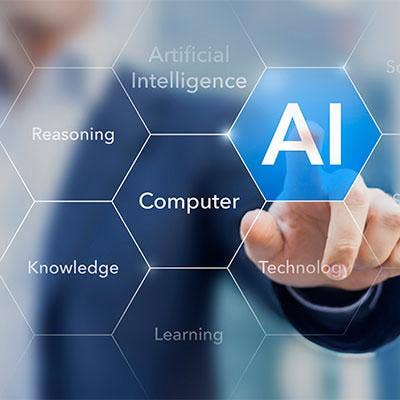Microsoft President Brad Smith's 5 Most Important Statements At Inspire 2018

Taking Responsibility In Tech
While Microsoft channel leaders took to the Inspire 2018 stage Monday to talk chiefly about opportunities for Microsoft and its partners, Microsoft President and Chief Legal Officer Brad Smith had a different focus. Smith used his keynote during the Inspire partner conference in Las Vegas to highlight the key responsibilities he sees for Microsoft and the rest of the tech industry -- and for governments worldwide, too. Smith's wide-ranging talk covered the topics of state-sponsored cybersecurity attacks, ethics in artificial intelligence technologies such as facial recognition, and diversity in the tech industry -- as well as touching on Microsoft's obligations following its acquisition agreement for open source code repository GitHub.
What follows are five key takeaways from Smith's keynote at Microsoft Inspire 2018.

Microsoft's Approach During 'Difficult Times' Globally
Smith reflected on the past year, when, he said, many troubling new trends have emerged worldwide. "We make technology that is global, but the world is increasingly focused on the borders that divide nations, rather than the technology that connects us," Smith said. "And even when people think about technology, they have a lot more questions than they did a year ago. Every day we see headlines about the anxiety people have about technology. We see people questioning whether they can trust technology."
For those in the tech community, "it really raises a fundamental question: how do we navigate these difficult times?" Smith said. "It starts with great products and services and partners and salespeople around the world. But in the world today, we actually need more than that. We need to engage in conversations with people around the world, and we need to back up those conversations not just with words, but with deeds."

Calls To Enact 'Arms Control' For Cybersecurity
The past year has seen cybersecurity concerns rise to even higher levels for customers and the tech industry. However, "one thing that has become increasingly clear over the past year is that the private sector cannot solve this problem by itself," Smith said. "Cybersecurity is no longer just about threats from hackers or criminal groups. It has increasingly become a situation where we're facing a cyber weapons arms race. We are seeing governments attacking users around the world."
In the wake of the WannaCry and NotPetya attacks, it's become clear that "this is not a situation where machines are attacking machines. This is a situation where governments are attacking people," Smith said, before showing a film documenting some of the human victims of the WannaCry attack in the United Kingdom and the NotPetya attack in Ukraine. Those included a heart patient who was unable to receive surgery at his originally scheduled time as a result of computer system disruption caused by WannaCry.
"We are calling on governments around the world to recognize the need for a new generation of arms control to address a new generation of weapons," Smith said. The legal duty of governments to protect civilians "needs to extend to cyberspace," he said. "It's why we've called for existing international law to be strengthened, and new international law to be added, in the form of a digital Geneva Convention."
Regulation Of Facial Recognition
The arrival of powerful artificial intelligence has brought with it a vast array of ethical questions -- and creates serious responsibilities for everyone working in the tech industry, Smith said. One issue that Smith is now focused on is facial recognition, and he's pushing for the enacting of government regulation of the technology (Microsoft's own facial authentication technology, Windows Hello, is beginning to see wider deployment in new Windows 10 PCs). Microsoft is calling on the world to "address head-on the issues associated with facial recognition -- a technology that offers enormous benefits but is also subject to great abuse," Smith said. "This is an issue that will require governments to step forward, that will call for a new generation of laws."
In addition, the potential abuse of facial recognition technology "will also call for the tech sector, and companies like Microsoft, to exercise more responsibility as well," Smith said.

Bringing More Diversity To AI Development
One other aspect of artificial intelligence that requires more attention is the importance of diversity, Smith said. "Think about it: we are empowering computers to make decisions that previously were always made by human beings. The only way we're going to create systems that serve the world is if we have a workforce that reflects the diversity of the world," he said.
While the tech industry is beginning to see more equality in terms of representation of women, "we have a long road ahead of us before we truly build an industry and an ecosystem that is as diverse as the world we serve," Smith said. "We're going to have to stay focused to do that. It's an imperative if we're going to create technology the world can trust."

The GitHub Responsibility
In early June, Microsoft announced an agreement to acquire open source code repository GitHub in a deal valued at $7.5 billion. More than 28 million developers use GitHub to share code and work together on open source projects, and the acquisition is expected to close by the end of the year. "This has been a journey for Microsoft," Smith said. "No one would've said, at the start of the century, that Microsoft is open source's best friend." Thus, the planned acquisition "is not just important in terms of the benefits that we can create for developers -- it's a symbolic crossing of the Rubicon for our company," he said.
GitHub "takes us far beyond anything we've ever done before [in working with developers]. Because in effect, we're taking on a new responsibility," Smith said. "We're taking on the responsibility to serve as the stewards for developers around the world -- open source developers, proprietary developers, even developers who create software for our competitors -- that we will be the steward and the protector of their home, of the place where they store their code."